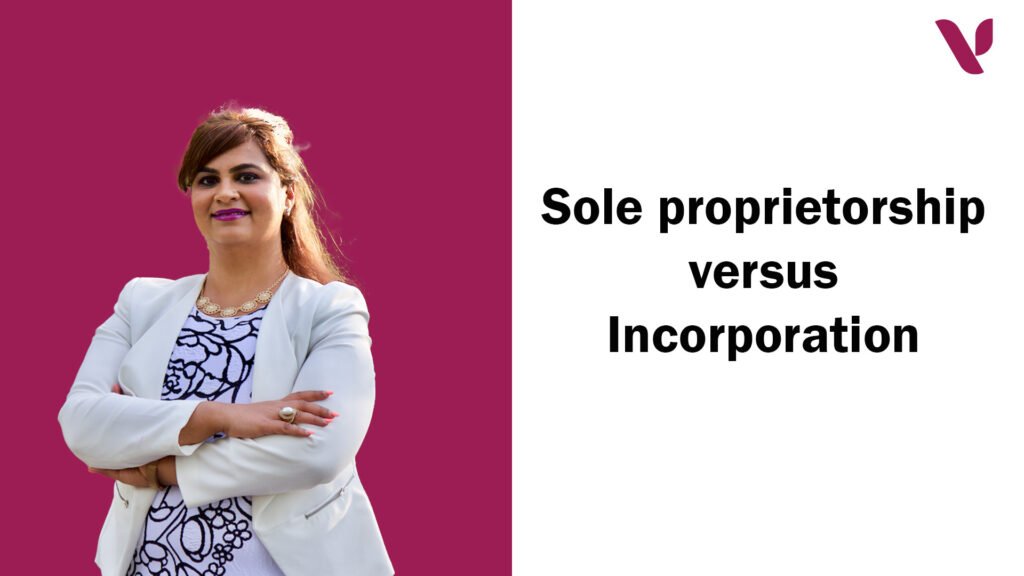Sole proprietorship versus Incorporation

Before you start a business, you may have to give some thought to deciding on a legal structure. Different legal structures offer unique benefits and limitations and to help you consider a legal structure that best suites your needs, take a look at both advantage and disadvantages to both sole proprietorship and a corporation.
What is Sole Proprietorship ?
Sole proprietorship essentially means a business that has no separate existence from its owners. It also refers to the person who owns the business and is personally liable for its debts. Many owners do very well with this model. This is often the route freelancers take because it requires no legal forms.
Benefits of a Sole Proprietorship
- It requires low start-up costs.
- You enjoy full control over decision making, no need for board or shareholder approvals.
- You can deduct business losses from other personal income, helping you remain in a lower personal income tax bracket.
- You need not observe formalities such as voting and meetings associated with more complex business forms.
- You don’t have to prepare separate financial statements for your business and other types of reports necessary for corporations.
Disadvantages of a Sole Proprietorship
- You’re fully liable. If your business incurs debt, you are personally responsible.
- If your business becomes profitable, it means you’ll personally pay more taxes. In most cases, you will likely jump to high tax brackets if your business starts making more profits.
- Raising money is more difficult if you’re a sole proprietorship. Financial institutions and investors may require your business to be incorporated before they give you a loan or make an investment.
Sole Proprietorship Government reporting requirements:
- Initial business registration
- Annual personal tax returns (including business T2125 return)
- Payroll remittances and filings (if additional employees exist)
- Sales tax (if sales of the business exceeds $30k you must register for GST/HST and track sales tax spent and collected)
What is an Incorporation ?
You have the option to incorporate under provincial law or federal law. Companies incorporated under provincial law can operate in any province or territory provided they register as extra-provincial incorporations. Companies must also register extra-provincially in each province or territory where they operate.
Regardless of whether you incorporate under provincial law or federal law, incorporating means that your business operates as its own legal entity, separate from you as an individual.
Benefits of an Incorporation
- Limited liability of the corporation’s shareholder, which means separation of personal and business obligations.
- Raising capital from investors and financial institutions is often easier.
- There is an ability to take advantage of possible tax deferral advantages that are available.
- The ability to take advantage of lifetime capital gains exemption (LCGE). Each individual resident in Canada can claim a LCGE to shelter capital gains on the disposition of qualified small business corporation (QSBC) shares.
- There is potential for continuance existence and estate planning for your business after the death of the owners and will be able to pass to heirs. Even if the heirs do not wish to continue on the business, they may still benefit from tax deferral by leaving the money in the corporation to invest.
Disadvantages of an Incorporation
- There are high administrative, legal and accounting costs associated with establishing and maintaining a corporation and also need to ensure all your paperwork is in order.
- There are stricter regulations and compliance requirements, where the corporation will have to hold annual shareholder meetings and maintain company records. If there are any changes to the board of directors, your corporation will have to file notices with the government.
- There’s a lot more work required with adhering corporate formalities, including yearly returns that must be filed with the government.
- Extreme care is required in setting up different classes of shares issued to each shareholders of the company.
- There will be restricted use of business losses. If the corporation incurs business losses, it can only be applied against corporation’s income and cannot offset the shareholders personal income.
Corporation Government reporting requirements:
- Setting up articles of incorporation.
- Annual information return – a brief return that details information about shareholders, officers, directors and general information about the corporation.
- Maintaining corporate records, which are separate and distinct from personal records (must be held for 6 years as per CRA regulations).
- Filing an annual corporate income tax return (T2 return) which includes detailed financial statements and other applicable tax schedules.
- Payroll remittances and filings (if the corporation has employees)
- Sales tax – if sales of the corporation exceed $30,000 you must register for GST/HST and track sales tax spent and collected.

